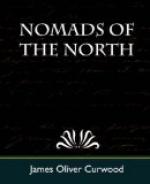For a month thereafter Miki insisted on hunting in the vicinity of the cabin, held there by the “pull” of the thing which he could neither analyze nor quite understand. Neewa accepted the situation good-naturedly for a time. Then he lost patience and surrendered himself to a grouch for three whole days during which he wandered at his own sweet will. To preserve the alliance Miki was compelled to follow him. Berry time—early July—found them sixty miles north and west of the cabin, in the edge of the country where Neewa was born.
But there were few berries that summer of bebe nak um geda (the summer of drought and fire). As early as the middle of July a thin, gray film began to hover in palpitating waves over the forests. For three weeks there had been no rain. Even the nights were hot and dry. Each day the factors at their posts looked out with anxious eyes over their domains, and by the first of August every post had a score of halfbreeds and Indians patrolling the trails on the watch for fire. In their cabins and teepees the forest dwellers who had not gone to pass the summer at the posts waited and watched; each morning and noon and night they climbed tall trees and peered through that palpitating gray film for a sign of smoke. For weeks the wind came steadily from the south and west, parched as though swept over the burning sands of a desert. Berries dried up on the bushes; the fruit of the mountain ash shriveled on its stems; creeks ran dry; swamps turned into baked peat, and the poplar leaves hung wilted and lifeless, too limp to rustle in the breeze. Only once or twice in a lifetime does the forest dweller see poplar leaves curl up and die like that, baked to death in the summer sun. It is Kiskewahoon (the Danger Signal). Not only the warning of possible death in a holocaust of fire, but the omen of poor hunting and trapping in the winter to come.
Miki and Neewa were in a swamp country when the fifth of August came. In the lowland it was sweltering. Neewa’s tongue hung from his mouth, and Miki was panting as they made their way along a black and sluggish stream that was like a great ditch and as dead as the day itself. There was no visible sun, but a red and lurid glow filled the sky—the sun struggling to fight its way through the smothering film that had grown thicker over the earth. Because they were in a “pocket”—a sweep of tangled country lower than the surrounding country—Neewa and Miki were not caught in this blackening cloud. Five miles away they might have heard the thunder of cloven hoofs and the crash of heavy bodies in their flight before the deadly menace of fire. As it was they made their way slowly through the parched swamp, so that it was midday when they came out of the edge of it and up through a green fringe of timber to the top of a ridge. Before this hour neither had passed through the horror of a forest fire. But it seized upon them now. It needed no past experience. The cumulative instinct of a thousand




